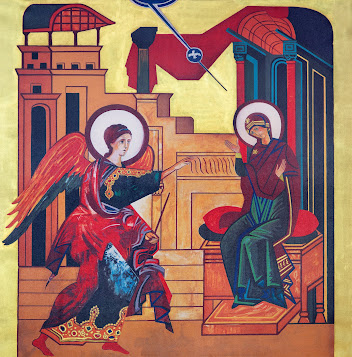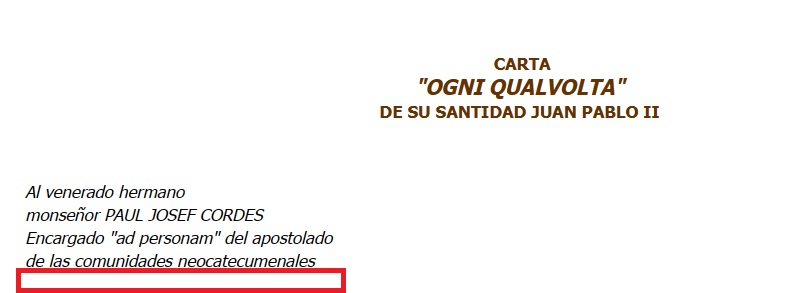[The following is an adapted translation of a recent article from Crux Sancta.]
It never ceases to surprise me that the Neocatechumenal Way's most important papers and documents are plagued with inaccuracies, mistakes, and gross errors. It cannot be coincidence, because chance does not exist for the believer, so something must intend to say and mean so much blunder.
On this occasion, I am going to point out some faults of one of the most hackneyed and oft-cited documents of the Neocatechumenal Way: Ogni Qualvolta.
For those who do not know, Ogni Qualvolta - a name which comes from the first two words of the Italian text - is a letter in which Pope John Paul II, after a series of justifications, made it clear that he recognized the existence of the Neocatechumenal Way.
Period. Only that: not on his own initiative, but at the request of a third party - from Kiko, according what is said here (see the bottom of page 3).
On August 30, 1990 - that is, a little more than two decades since the official birth of the Way - the Pope sent a letter to the then-ad personam manager of the apostolate of the Neocatechumenal communities, a letter in which he let his brothers in the episcopate know that yes, he was aware of the existence of what insisted on being a movement or an association (contrary to the words of the Pope himself, by the way).
The letter, therefore, does not come from the Pope and is also addressed not to the NCW - which would be the case if it contained an approval, which some falsely claim - but to Bishop Paul Josef Cordes, Vice President of the Pontifical Council for the Laity.
And here, in the addressee, is the first weird thing.
The letter is published in Italian, Spanish, and English. In the Italian and English versions, the addressee is not only in charge of the apostolate of the Neocatechumenal communities (he was from 1980 to 1995), but he is also Vice President of the Pontifical Council of the Laity, which is a more substantial position. But in the Spanish version, mysteriously, Bishop Cordes is nothing for the PCL - that is, his position in said Council does not appear in the letter.
Amazing.
Then, almost at the end of the letter, we find the paragraph that so many Neocatechumenals quote--or rather, misquote.
...having seen the documentation you have presented: accepting the request addressed to me, I recognize the Neocatechumenal Way as an effective means of Catholic formation for society and for the present time.
It is important here to highlight a key word that, while absent in English, appears in both Spanish and Italian.
In Spanish: "reconozco el Camino neocatecumenal como un itinerario de formación católica, válida para la sociedad y para los tiempos de hoy."
And in Italian: "riconosco il Cammino Neocatecumenale come un itinerario di formazione cattolica, valida per la società e per i tempi odierni."
The word, of course, is "valid." The Pope recognizes the Way as an itinerary of Catholic formation, which is valid for society and for the present time.
In English, we lose not only the word itself, but also the wonderful fact that it is a gendered adjective. As a feminine, it indicates that the validity for society and for today's times refers to Catholic formation (a feminine noun), not to the itinerary (a masculine noun).
In other words, John Paul II never recognized that a certain itinerary was valid for society and for today's times. What he recognized is that Catholic formation is valid for this society and for these times, and that the NCW is a path of Catholic formation (at least, that's what they made him believe).
Therefore, what JP2 declares is that the validity for society and for today's times lies in Catholic formation and only in Catholic formation, not in the itinerary itself.
But this, which is true, must hurt some sensitivities, so they distort the letter in a foolish attempt to transform the written word into a false approval of absolutely everything, that exists only in some Kiko-tized minds.
But wait, there's more.
John Paul II wants the bishops to "appreciate and assist" this work, provided that it is "in a spirit of service to the local ordinary and of communion with him, and within the unity of the...Church."
It is obvious that it could not be otherwise, no matter how much some gnash their teeth, squirm, and invent persecutions.
And the note at the end of the letter is no less interesting:
The Holy Father's intention in recognizing the Neocatechumenal Way as an effective process of Catholic formation, is not to give binding instructions to the local Ordinaries but only to encourage them to give careful consideration to the Neocatechumenal Communities. However, he leaves it to the judgment of the Ordinaries to act according to the pastoral needs of their own dioceses.
That is to say: full freedom for the bishop who deems it convenient to close the door of the diocese in their faces. Or, to put it another way, the bishop who decides that the NCW is superfluous in his diocese is certainly not possessed.
And once again, it is curious that this note appears in the Italian and English versions, but for inextricable reasons it has been lost and vanished in the Spanish version.
Why is it that error and concealment are inseparable from the Neocatechumenal Way?








No comments:
Post a Comment